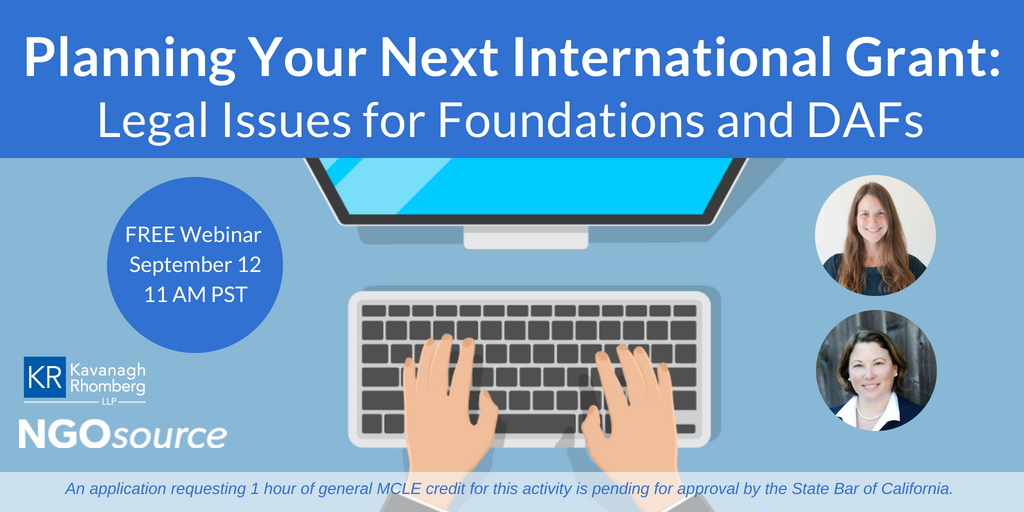
Join our friends and legal experts Martha Lackritz-Peltier and Brigit Kavanagh for NGOsource’s next webinar – “Planning Your Next International Grant: Legal Issues for Foundations and DAFs” on Sept. 12 at 11 AM PST. Register free here.
This one-hour webinar will discuss various issues private foundations and donor advised funds should consider before making grants to foreign organizations. Topics include whether an equivalency determination is the right choice for your grantee; rules around grants to foreign government agencies, instrumentalities, or international organizations; understanding the out of corpus rules; and other potential traps for the unwary.
.
An application requesting 1 hour of general MCLE credit for this activity is pending for approval by the State Bar of California.
Rev. Proc. 2017-53
Revenue Procedure 2017-53 reflects changes to the equivalency determination final regulations published in 2015, including the elimination of the ability of a private foundation to rely on a grantee affidavit for purposes of the special rule.
[A] private foundation grantor that wishes to have a grant to a foreign organization grantee that lacks an IRS determination letter treated as made to a qualifying public charity generally must complete two steps in making an equivalency determination in compliance with §§ 53.4942(a)-3(a)(6), 53.4945-5(a)(5), and 53.4945-6(c)(2)(ii). First, the grantor (through one or more foundation managers) must make a good faith determination and a reasonable judgment that the grantee is a § 501(c)(3) organization (other than by reason of § 509(a)(4)). Second, the grantor must make a good faith determination that the grantee is a qualifying public charity for purposes of §§ 4942(g) and 4945(d)(4).
…
Regulatory requirements for an equivalency determination under § 53.4945- 6(c)(2)(ii).
Section 53.4945-6(c)(2)(ii) provides that a private foundation grantor may treat a foreign grantee as an organization described in § 501(c)(3) if:
(1) In the reasonable judgment of the foundation manager (as defined in § 4946(b)), the grantee is described in § 501(c)(3) (other than an organization that tests for public safety);
(2) The grant is made for purposes described in § 170(c)(2)(B) (charitable purposes); and
(3) The grant is not a transfer of assets pursuant to a liquidation, merger, redemption, recapitalization, or other adjustment, organization, or reorganization of the foundation under §§ 507(b)(2) and 1.507-3(c)..
Regulatory requirements for an equivalency determination under §§ 53.4942(a)- 3(a)(6) and 53.4945-5(a)(5).
In 2015, the Treasury Department and the IRS finalized the regulatory requirements for equivalency determinations under §§ 53.4942(a)-3(a)(6) and 53.4945-5(a)(5) (TD 9740; 80 FR 57709; 2015-42 IRB 573) for purposes of determining when a grant is a qualifying distribution and not a taxable expenditure. The regulations provide a general rule that the private foundation grantor may treat a foreign grantee as a qualifying public charity if the foundation has made a good faith determination to that effect. The regulations also include a special rule that a private foundation’s determination ordinarily will be considered made in good faith if it is based on written advice that is “current” and received from a “qualified tax practitioner” concluding that the grantee is a “qualifying public charity,” and if the foundation reasonably relied in good faith on the written advice in accordance with the requirements of § 1.6664-4(c)(1) in making the determination. Under this special rule, the written advice must give enough facts concerning the foreign grantee’s operations and support to enable the IRS to determine that the grantee would likely qualify as a qualifying public charity as of the date of the written advice. This special rule reflects three significant changes from the equivalency determination process provided under the prior regulations: (1) a general broadening of the class of qualified tax practitioners that could prepare written advice; (2) elimination, under the special rule, of reliance by a private foundation on grantee affidavits without current written advice received from qualified tax practitioners (although such reliance is still permissible in appropriate circumstances under the general rule); and (3) the addition of a new definition of the period for reliance on written advice received from qualified tax practitioners for purposes of the special rule.
…
(1) Written advice that is current.
…
(2) Qualified tax practitioner.
…
(3) Qualifying public charity.
…
(4) Reasonable reliance in good faith under § 1.6664-4(c)(1).
…
(5) General requirements imposed on qualified tax practitioners in preparing written advice.
…
Additional Resources
International Grantmaking: Equivalency Determinations
International Grantmaking: Expenditure Responsibility
New Safe Harbor Procedures for Equivalency Determinations (Council on Foundations)
IRS updates guidance on good faith determinations for private foundations making foreign grants (Ernst & Young LLP)